What Are Corporate FDs and How Different Are They From Bank FDs in 2024?

Fixed Deposits have always been a favourable investment option among investors who look forward to consistent returns over a period. Many folks relate fixed deposits closely with bank deposits as they usually find this investment tool there. However, there is another better option that is often overlooked by investors – Corporate FDs. According to investment experts, corporate fixed deposits tend to carry higher interest rates compared to banks. However, it is to be noted that they are not supposed by any guarantee or collateral. Hence, they are considered unsecured.
In a typical fixed deposit, a person invests the money in an FD through a bank which accrues interest over the defined period and gets the final amount once the FD matures. Now, like banks, a few other entities like NBFCs, corporations, and other financial institutions are permitted to raise funds for their existing and upcoming activities. Such types of fixed deposits are considered CORPORATE FIXED DEPOSITS (CORPORATE FD).
What Are Corporate Fixed Deposits?
In corporate FDs, businesses obtain funds from the general public in the form of fixed deposits for a particular time. The invested amount is then used for various chores for a fixed time whereas the investor is promised to get a particular interest rate by the corporate. This is an easy way for corporations to raise money for several things. Though corporate FDs provide better interest rates than typical FDs, they are unsecured. Being considered unsecured loans, fixed deposits emerge as an easier way for businesses to get cash for their different types of commercial needs.
Corporate FD vs Bank FD
Fixed Deposits (FDs) refer to savings accounts that provide better interest rates than typical savings accounts. It is a kind of term deposit where people invest a specific amount at monthly intervals to earn interest over the same. The amount can be withdrawn at the time of maturity. There is no obligation on the investor’s side to make timely monetary contributions to fixed deposits as they are one-time investments.
To understand both types of fixed deposits in India, it is necessary to understand the similarities and differences between them. Let’s get to know them below.
- Assured Returns: The first and foremost advantage of corporate and bank fixed deposits is the guaranteed return to the investors. Irrespective of the market direction, either positive or negative, the corporate FD rates tend to be fixed and guaranteed. The investors can choose to get the return that was guaranteed to them by the bank or authority at the maturity of your FD's term.
- Flexible Tenure: A person may choose the period of investment in the care of corporate fixed deposits. Corporate FDs usually come with a tenure of one to five years as a short-term investment. This enables investors to pick an appropriate tenure to achieve their financial goals.
- Better Interest Rate For Senior Citizens: Similar to bank fixed deposits, a majority of corporate fixed deposits allow elderly citizens to get better corporate FD rates. For elderly people whose income is dependent on sources other than their fixed deposits, this is of immense benefit.
- Higher interest Rates: The most salient feature of corporate FD is its interest rate which is greater than that of bank FDs.
- Choice of Withdrawal: Most corporate fixed deposits offer both cumulative and non-cumulative interest-based distributions which is quite beneficial for investors. The cumulative interest payment includes reinvestment of your interest earnings passing through a compounding algorithm. The strength of compounding ultimately leads to bigger payments as a result of this.
- Lower Penalty Tenure on Premature Withdrawal: Corporate fixed deposits usually come with a penalty period of just 3 months which is found to be the lowest penalty period as per the Reserve Bank of India's (RBI) standards. This is in contrast to bank FDs, where the penalty period is as long as maturity.
- Curtailed Tenure: Contrary to bank FDs, which may have longer terms in years, corporate FDs have a maximum tenure of only five years. As a result, they are an excellent short-term investment decision.
- Safety rating: All corporate FDs and eligible NBFCs receive safety ratings from top credit rating companies like CRISIL, CARE, and ICRA. Investors can stay confident when it comes to the dependability and legitimacy of corporate FDs.
- Risk Attached with Corporate FDs: Corporate FDs are considered products with low security which means that investors are at risk of losing their money in the case of default. To safeguard the investment of investors, the RBI and the Ministry of Corporate Affairs have put in place stringent rules and standards for NBFCs. Investor funds can only be accepted as corporate fixed deposits by NBFCs that comply with the regulations.
Also Read: Differences Between Cumulative and Non-Cumulative Fixed Deposits
Are There Any Risk Factors or Considerations Before Investing in Corporate FDs in 2024?
Corporate Fixed Deposits (FDs) are subject to regulations from the RBI and the Ministry of Corporate Affairs, but they still carry intrinsic risks. These FDs can only be issued by companies that meet specific criteria, including a minimum credit rating set by the RBI and assessed by credit rating agencies like CARE, ICRA and CRISIL.
Despite the criteria, there are persisting risks in corporate FDs. The financial deterioration of companies (for example Dewan Housing Finance Ld) can lead to potential defaults. To mitigate these risks, it is advisable to opt for higher-rated FDs, but thorough research and diversification are essential to eliminate potential risks associated with corporate FDs.
- Disregarding Credit Ratings: When investing in Corporate FDs, it is crucial to consider the credit rating of the issuing company. This rating reflects the company’s financial stability and creditworthiness. Investing in FDs from companies with low credit ratings increases the risk of default. To safeguard your investment, always verify the credit rating assigned by reputable credit rating agencies to ensure the financial health of the company offering the fixed deposit.
- Seeking High Returns Without Assessing Risks: It is crucial to consider the associated risks when pursuing higher interest rates. Companies offering exceptionally high interest rates may be compensating for higher risk, so it is important to evaluate the balance between returns and risks. Instead of being swayed solely by a seemingly lucrative interest rate, it might be more prudent to opt for a moderate and sustainable return with lower risk in the long run.
- Ignoring Liquidity Requirements: Consider carefully assessing your liquidity needs before investing in corporate FDs and choosing a tenure aligned with your financial goals to avoid penalties for premature withdrawal. If you require access to your money in the short term, avoid locking it in for an extended period. Additionally, consider selecting FDs that offer periodic interest payouts if you rely on a regular income stream.
- Ignoring Terms and Conditions is Risky: Investors often overlook the terms and conditions of corporate FDs. It is important to thoroughly read the offer document and terms of the FD to understand the interest payment frequency, renewal options and penalties for premature withdrawal. This will help prevent unpleasant surprises and inform your decisions.
Concentrating FD Investments in One Company: Diversification is crucial in investing. It is wise to avoid investing all your money in a single company, no matter how financially stable it appears. Spreading your investments across multiple banks helps minimize the risk and safeguards your portfolio from the possible default of one company. To mitigate concentration risk, it is recommended to create a balanced portfolio by investing in corporate FDs from companies representing different sectors. - Premature FD Closure: Premature closure of fixed deposits can lead to penalties and loss of interest earnings. It is important to assess your financial needs and choose a tenure that aligns with your goals. Consider FDs with more flexible terms or partial withdrawal options if you may need funds before maturity. Understand the penalties and restrictions associated with premature closure to avoid financial setbacks.
- Disregarding Inflation: Before finalizing an investment, it is crucial to consider the impact of inflation on the real value of your returns. Inflation erodes the purchasing power of money over time, so it is important to evaluate the interest rate in the context of prevailing inflation rates and explore investment avenues that offer returns that outpace inflation to ensure your money retains its value over the long term.
- Rely Solely on FDs: Depending only on corporate FDs for investment can be risky as they may not offer the same potential for wealth creation as other avenues. Diversifying across asset classes like fixed-income instruments, mutual funds, ULIPs and equities helps in spreading risk and enhancing the overall potential for returns. It is important to have a balanced approach to wealth creation.
Also Read: List of Top 7 Leading Credit Rating Agencies in India 2024
How Much Tax Do I Need to Pay for Interests Earned in Corporate FDs?
Interest earned on corporate fixed deposits is only taxable when it exceeds 5000 rupees. If the interest received surpasses 5000 rupees, TDS is deducted at a rate of 10% if the PAN details are provided. The deduction rate is 20% if PAN details are not provided.
FAQs
1. What Documents Are Required to Open A Corporate FD?
To apply for a Corporate FD, the person must have a current, legally recognised identity and address evidence, such as an Aadhaar card, passport, or voter identification.
2. What Considerations Should A Person Make While Selecting A Corporate Fixed Deposit?
Before choosing a particular corporate FD, it is essential to consider the credit rating of the company providing the FD. A higher credit rating might signify lower risk.
3. What are the Several Ways That Company FDs Can Pay Their Interest?
Cumulative and non-cumulative interest payments are the two available alternatives. If you go with the first option, the returns will be invested and will be payable only after the investment reaches maturity. If you prefer the non-cumulative option, interest payments will be made to the investor regularly.
The Conclusion
As there are different types of fixed deposits available to investors, choosing a particular one is entirely up to you because every tool has its advantages and disadvantages. However, it is recommended to choose an option that matches perfectly with your investment needs and budget. A corporate fixed deposit is the best option for you if you are looking forward to the highest FD rates choose Investkraft. However, choosing a standard bank FD is advised if the security of your money is your concern. Therefore, it is up to you to choose a fixed deposit plan that suits your preferences.
Related Post
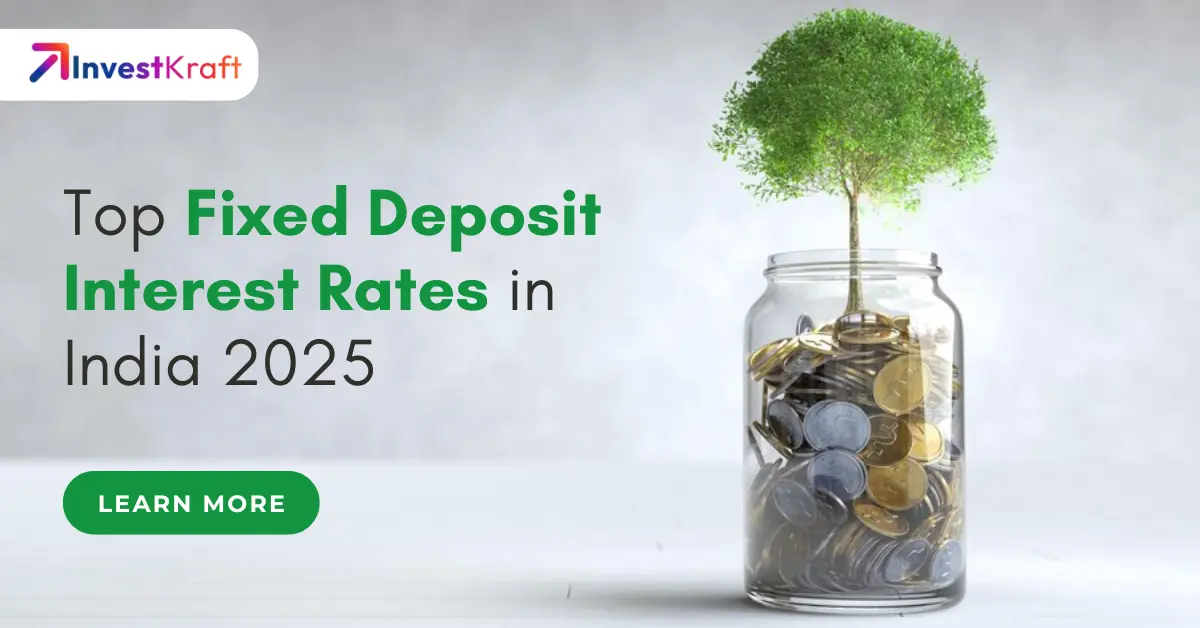
Fixed Deposit (FD) Explained: Best Interest Rates & Investment Guide for 2025
Fixed Deposits (FDs) are a popular investment tool, especially favoured by those seeking a sta...
Read more...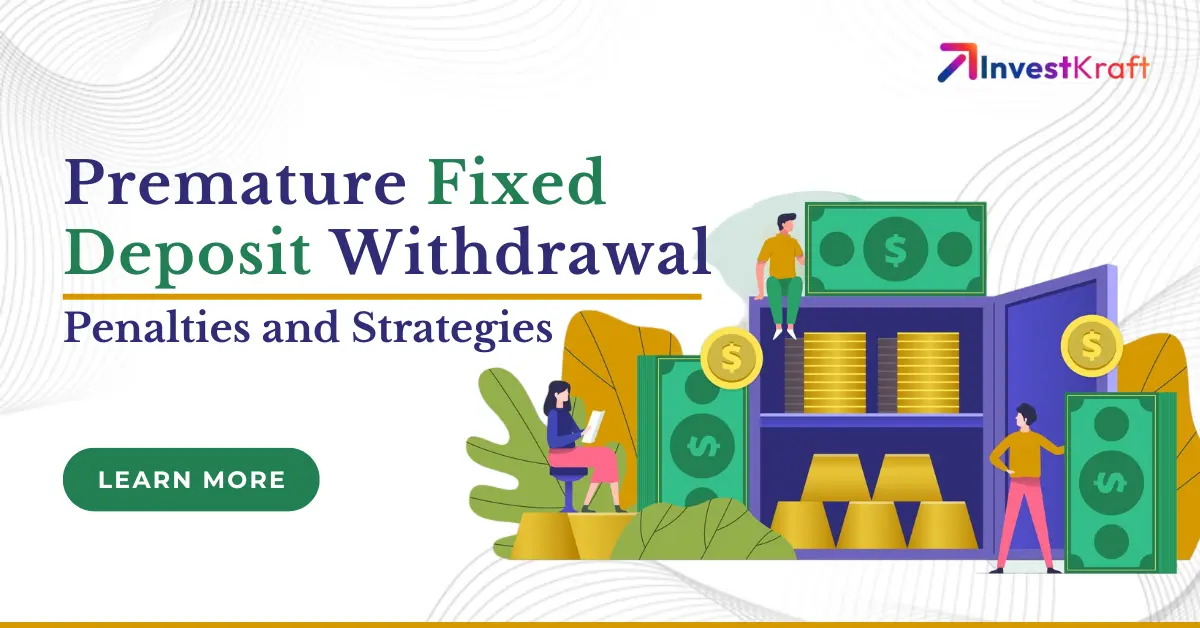
How to Escape from Early Withdrawal Penalties of Fixed Deposits?
Fixed deposits are popular for investing money as they provide security and steady growth. However,...
Read more...
Invest Wisely, Retire Comfortably: A Guide to Senior Citizen Fixed Deposits (FDs) in 2024
The interest rates for senior citizens who invest in fixed deposits can vary depending on factors su...
Read more...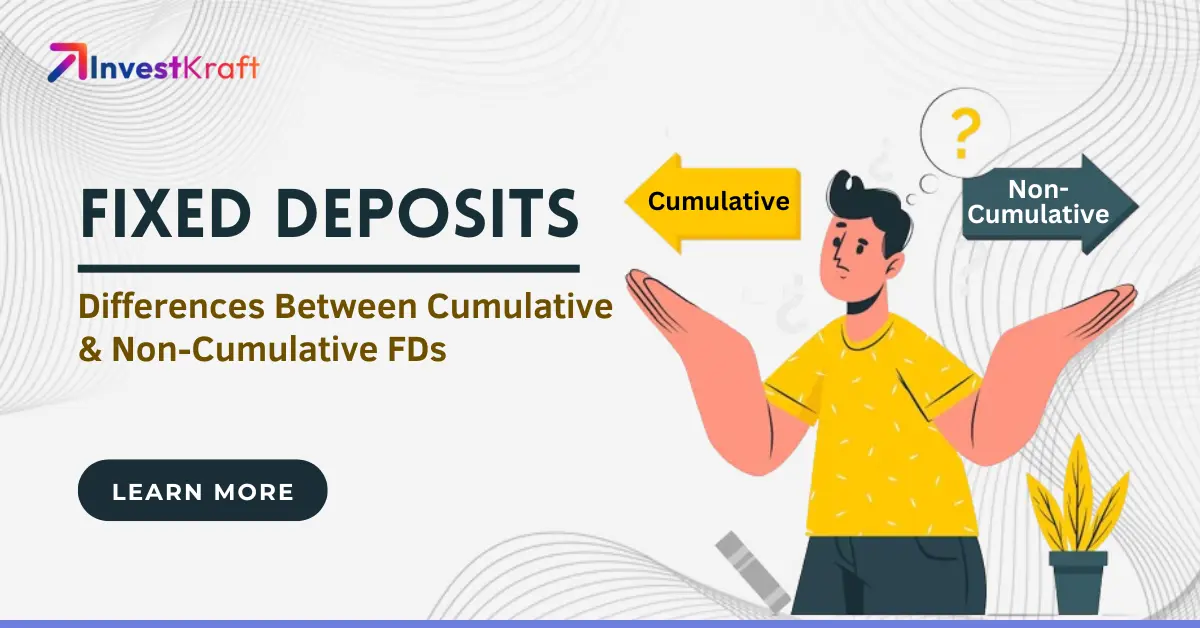
Differences Between Cumulative and Non-Cumulative Fixed Deposits
A fixed deposit is a safe investment option in India that guarantees returns through interest. There...
Read more...
Step by Step Guide to Using a Fixed Deposit Calculator Online
Step by Step Guide to Using a Fixed Deposit Calculator Online, The nicest thing about fixed dep...
Read more...
What Are Corporate FDs and How Different Are They From Bank FDs in 2024?
Fixed Deposits have always been a favourable investment option among investors who look forward to c...
Read more...
Recurring Deposits (RD) – Benefits, Features, and How to Open RD Account
Among the different types of investment products available in India these days, recurring deposits a...
Read more...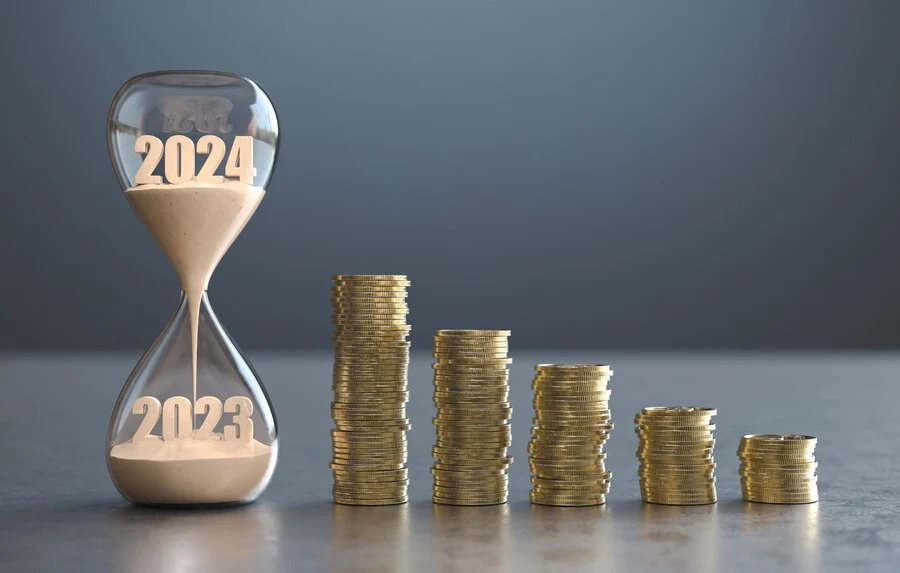
Grow Your Money Safely: A Comprehensive Guide to Fixed Deposits (FDs) 2024
Fixed deposits have been considered a time-tested investment tool to get guaranteed returns on inves...
Read more....webp)
Understanding the Impact of Inflation on Your Fixed Deposit Returns
Fixed Deposits (FDs) are indeed widely favoured due to their stable and guaranteed returns, making t...
Read more...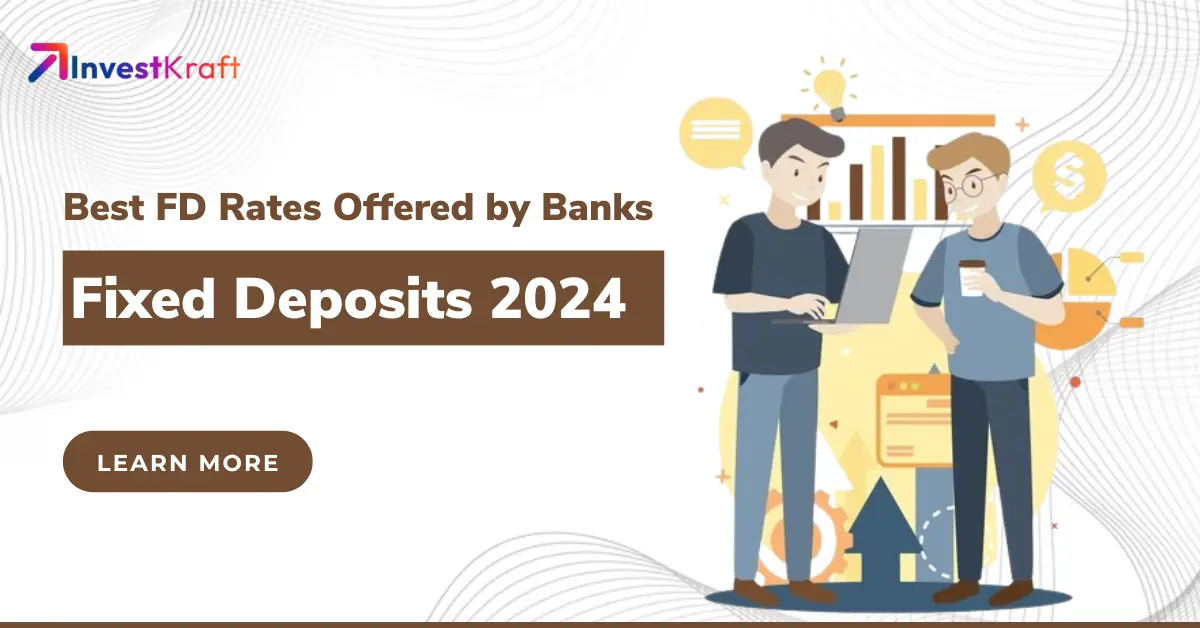
Comparative Analysis: Best FD Rates Offered by Banks in 2024
When it comes to choosing the safest and most consistent investment avenue in India, a majority of p...
Read more...Reach out to our Experts if you have any Doubts
Like the best things in life, Consultations @InvestKraft are free
Drop a Mail or give us a Missed Call & Begin your Investment Journey here








